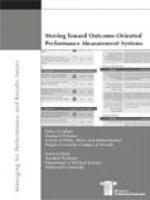
Moving Toward Outcome-Oriented Performance Measurement Systems

Public managers in communities across the country are under increasing pressure by the public to report on the outcomes and results of their programs. With both internal and external demands for information, public managers not only need to provide an accounting of resources expended and services provided, but also report on performance and outcomes.
The authors describe a shift taking place both within government and through independent community indicator projects devoted to developing broad, outcome-oriented indicators of how well a community is doing. They also describe the challenges public managers face in making sense out of the data they collect to inform their decision-making and also inform the public.
The report provides examples of outcome-oriented performance measurement systems in place around the country, describes their findings from these case studies, and offers practical recommendations on how to develop useful outcome-oriented measurement systems that other communities - either sponsored by government or community indicator projects - can act upon.



